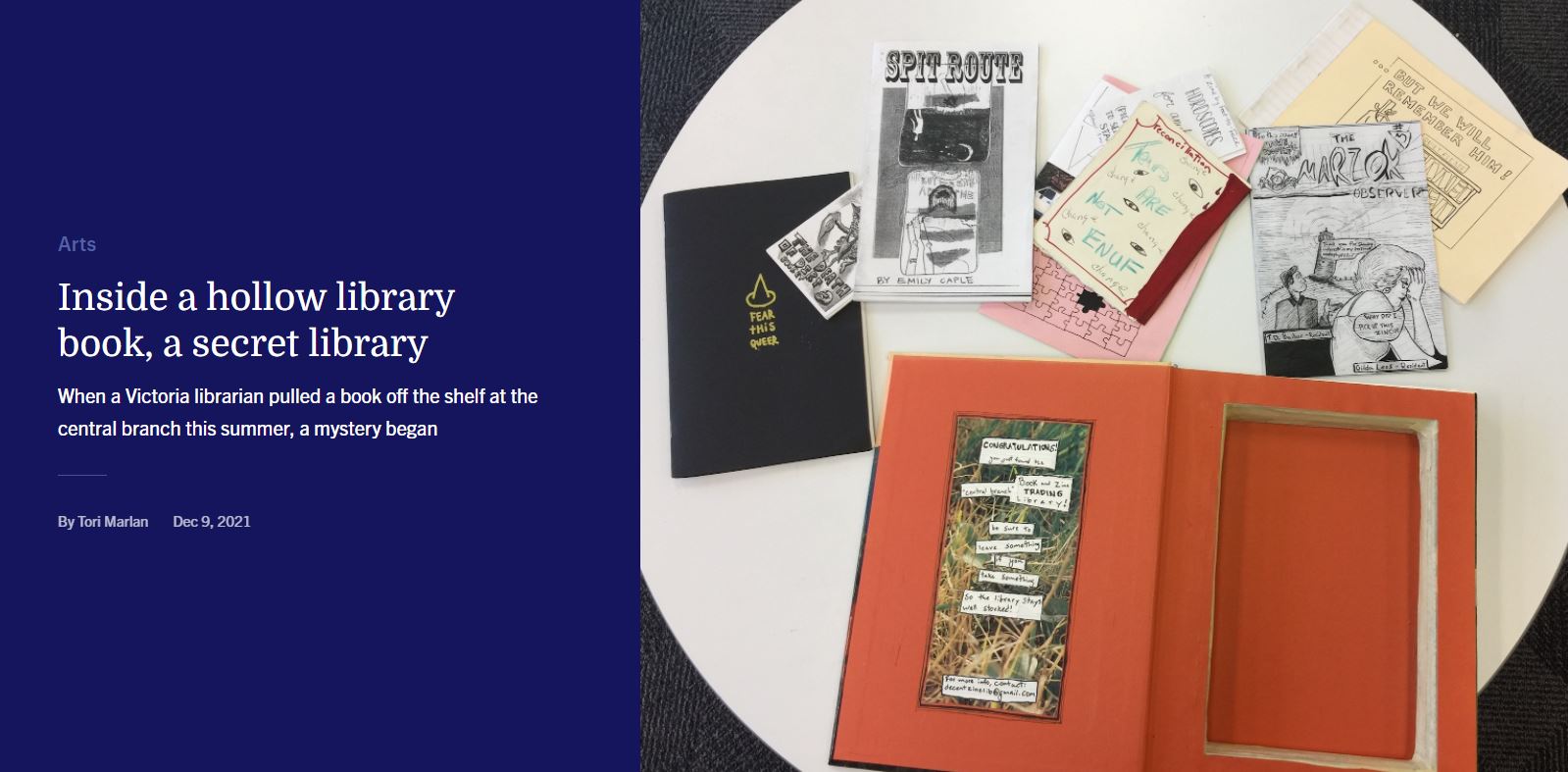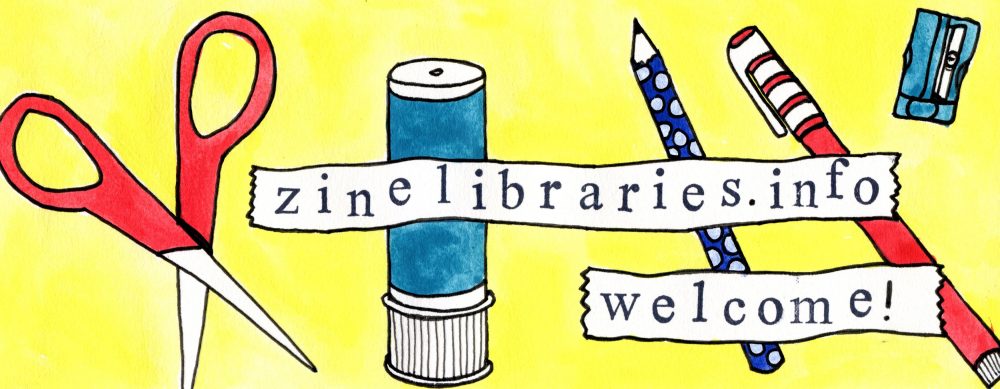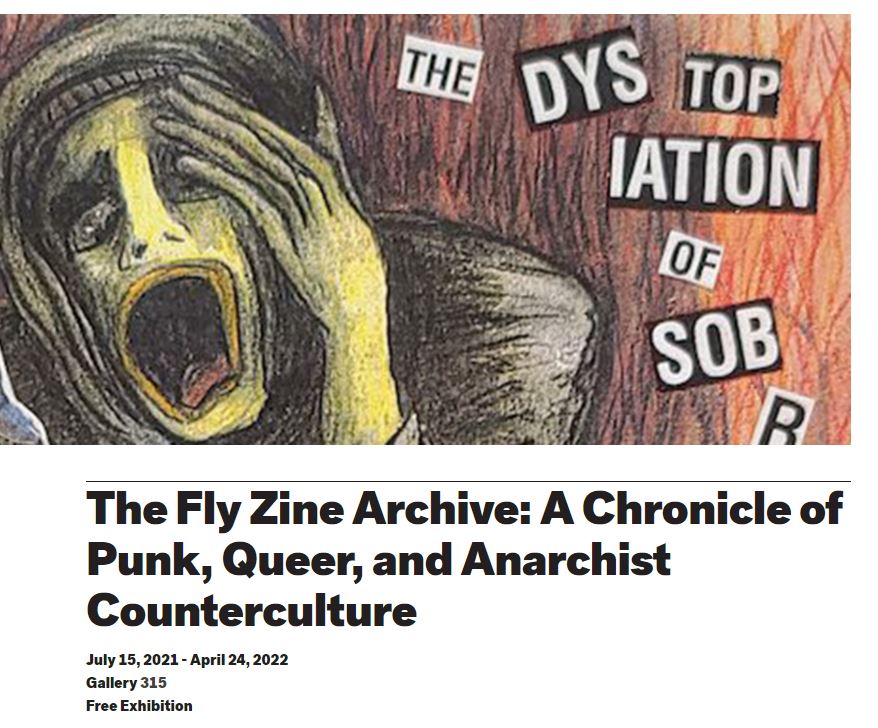Aj Michel, creator of the long-running zine Syndicate Product, has published a new site called “From Staple to Spine: A Compendium of Zine-related Books“. The site features 140 titles of books based on zines, including individual titles, multi-author anthologies around a particular topic, academic works, and how-to-guides. If you have additional books to include, get in touch with Aj to suggest an addition!
Category Archives: meta
secret zine library hidden inside a library book
Here’s a very cool story from the Greater Victoria Public Library in British Columbia, Canada: “Inside a hollow library book, a secret library.” A hollowed out book placed on a library shelf featured a zine library created by an anonymous artist and known about only via word of mouth. It’s a great detective story and a fun idea—I hope it inspires others to try similar projects!
Fly Zine Archive at Minneapolis Institute of Art
A new exhibit titled “The Fly Zine Archive: A Chronicle of Punk, Queer, and Anarchist Counterculture” is opening at the Minneapolis Institute of Art (MIA) on July 15, 2021. The exhibit will be open through April 2022. The archive consists of nearly 2,000 printed works – zines, comics, pamphlets and more – collected by activist Fly Orr and created by “punk, anarchist, feminist and LGBTQ+ artists.”
Read more about the Fly Zine Archive in this 2020 post from Ian Karp: “Rebel voice: Inside the Fly Zine Archive, a chronicle of punk, queer, and DIY counterculture” and explore more about the creation of the exhibit in this July 2021 article from the University of Minnesota student newspaper, “Recent UMN grad organizes new zine exhibition at Minneapolis Institute of Art.”
IZLUC2020 Zine: Call for Contributions
The International Zine Librarians unConference 2020 was a breathtaking experience and collaboration. Let’s document how we made it happen and our feels about it.
 We want to cover the topics listed on this spreadsheet and welcome others. Contributions can take the form of narratives, lists, recipes, limericks, comics, or whatever you’ve got, but note that the mission is providing documentation for next time. You can layout your own piece or leave the design to the co-editors. Just be sure to leave us a nice margin!
We want to cover the topics listed on this spreadsheet and welcome others. Contributions can take the form of narratives, lists, recipes, limericks, comics, or whatever you’ve got, but note that the mission is providing documentation for next time. You can layout your own piece or leave the design to the co-editors. Just be sure to leave us a nice margin!
“Engaging the Future of Zine Librarianship”
We haven’t frequently highlighted scholarship about zine librarianship on this site, but when I read Ann Matsushima Chiu‘s chapter on “Engaging the Future of Zine Librarianship” in Librarians with Spines (Los Angeles : HINCHAS Press, 2017), I wanted to recommend it to other zine librarians. Chiu writes from her own experience as well as interviews with two experienced zine librarians, Cathy Camper (Multnomah County Public Library) and Jenna Freedman (Barnard College). The chapter moves beyond discussing how to establish zine collections within libraries, and focuses on the need for creating sustainable collections. Topics include the importance of institutional buy-in from the library as a whole, strategic and effective succession planning, and building communities through zine networks (including shout outs to the Zine Librarian email list, the Zine Pavilion, and the Zine Librarian unConference!).
I’d highly recommend this chapter as a prompt for thinking about establishing zine collections which are not just one librarian’s pet project, but instead are seen as integral parts of building more holistic library collections.
Ordering information for the Librarians with Spines book: from the publisher. Library info: WorldCat record.
XD Tribute to Zine Librarians
 In Xerography Debt #33, editor Davida Gypsy Breier says nice things about us:
In Xerography Debt #33, editor Davida Gypsy Breier says nice things about us:
“As a zinemaker, I often go about my business of making zines because I still believe in tangible artifacts. Or, as Jeff Somers says in his column in this issue, they have discreteness. I forget that with print runs frequently fewer than 500, or even 100 copies, zines are often ephemeral. I knew that zine collections at libraries exist, and have contributed to several, but it wasn’t until after the [Caxton Club zine] symposium that it really sunk in that these librarians and archivists are unsung heroes of zine culture. They are saving and preserving documentation on events and subcultures that would otherwise go unrepresented or be grossly misrepresented. They are also working to make zines discoverable to new readers.
“So I would like to dedicate this issue to the zine librarians and archivists out there who are working to support and protect zines. Thank you!”
Aw, shucks, Davida! It’s our pleasure. 🙂
Check out these themes! Plus, art contest
1. Theme-off
After much discussion, it seems to make sense to stick with WordPress. We’ve narrowed our theme options to two: Tweaker4 or 2011. We’ve currently updated to Tweaker4, which will be up until next Friday, November 25. Then we’ll put 2011 up until December 2. So please poke around with each theme and send comments to kellymce [at] gmail.com by December 2.
Keep in mind, the content will still be shifting, this is more about the aesthetics and functions.
Since it doesn’t show up in the title menu, take a look at how wikis will look: http://zinelibraries.info/wiki/test/
2. Art contest
Down the line, we’ll be changing the URL to Zinelibrarians.net, restructuring things, and making it easier to add and use content. As part of this process, we need some new art to freshen up the site, and we want your help.
We most need the following:
– a banner at the top of the display
– small badges that folks can proudly post on their own websites
– a general logo that can be easily repurposed
But additional ideas are welcomed!
At this point, please don’t bother making a refined product — just submit a rough sketch, and any explanation you deem necessary. Entries are due December 18, 2011. Sketches will be posted to the website for public voting. The winner will be asked to produce a more complete design by early in 2012. Email your entries (and any questions) to kellymce [at] gmail.com.
Zine Librarians’ Primary Web Resources
There’s been a request for a little extra info about the primary communication pages for zine librarians. I’ve added the ones I know about and since I registered for two of them today, I’ll annotate the processes required by each briefly.
> *We Make Zines (ning site) – wemakezines.ning.com
This one is probably the most complicated to get settled into. One trick is just to think of it like a zine-specific, simplified version of facebook or myspace.
On the home page, you’ll see multiple “signup” buttons on the right side of the screen. Click any. Fill in your registration data and create your user name and password. The process is pretty straighforward. Once you’ve registered, you’ll be redirected to a welcome page on the authenticated side of the site. If you look in the upper right corner again, you’ll see a few new options available to members:
Inbox: needs no explanation
Alerts: Alerts are messages sent to you by applications you or your friends have added.
Friends: functions just the way any social networking site does (facebook, myspace.)
Settings: Through this option you can do things like set up your profile, add pictures, and change your privacy settings.
Setting up a profile is quickly accomplished, if not exactly intuitive. Once you click “settings” you’ll be directed to a page with fields asking for your profile information, gender, age, location, etc. Fill in as much or as little as you like (and, as mentioned before, if you want nothing to be visible, edit your profile in the privacy settings page.)
The final step is adding information about your professional activities (your zine doings) in your profile. Goto the page wemakezines.ning.com/profile/yourprofilename. From this page you can add your information either in the text box provided, or blog style. Please, as a zine librarian or ZL sympathizer, give us all a clear idea of where you work, what your collection’s mission is, your areas of interest in the big scheme of zine librarianship worldwide (web development? cataloging? programming? preservation? etc.) Aside from aesthetic improvements to your profile, you’re done!
This is primarily used for email correspondence. To subscribe, send an email to zinelibrarians-subscribe@yahoogroups.com
> *zine unconference wiki site
This site was the planning hub for ZL(u)C 2009 at the Hugo House and Zapp in Seattle. Now it is the temporary home for the outcomes of the conference workshops and discussions and hub for workgroups to organize their thoughts and strategies. It functions as a typical wiki and anyone can edit any page (though please try not to delete anything if possible)
You are here. It has been suggested that this site become the primary reference point for all zine librarian related needs including policy and procedure manuals, programming help, cataloging discussions, and other meta-knowledge type, ongoing discussions. No need to register with the site in order to read or comment on posts. If you would like to be able to contribute to the knowledge pool, though, you will have to register and be approved by one of the site moderators.
There was a lot of talk about zinewiki at ZL(u)C 2009. The discussion seemed to be heading in the direction of making zinewiki.com some sort of reference encyclopedia for zines and possibly the authority file. Jerianne, one of the site moderators, expressed a little concern about not wanting it to get too cluttered with tangential entries and information. For now, it’s a text catalog 2,500 strong and constantly being updated. No need to register at all.
zine librarian zine 3: do it yourself in your library
Note the master file has a page out of order or backwards. Double check before you assemble it!
The zine was edited by Rachel Murphy, Jenna Freedman and Alycia Sellie, with the blessing of the original Zine Librarian Zine-ster, Greig Means. Cover by Torie Quiñonez.


